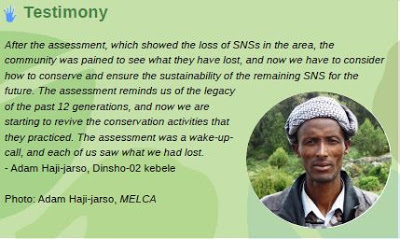Mr. Haji-jarso, was referring to the results of a participatory mapping assessment facilitated by Tesfaye Tola, from the Ethiopian NGO MELCA, which was conducted in 3 neighbouring kebeles in the Bale Mountains area, Ethiopia. This assessment aimed to determine the status of Sacred Natural Sites (SNS) in the area. SNS are biologically diverse natural cultural centres where local communities gather to help one another, resolve conflicts, establish common law, and worship. Local communities in the area have stewarded their natural resources through SNS for generations.
Natural Justice’s Dr Cath Traynor assisted MELCA to produce the preliminary findings of the assessment, and a flyer is available here. The Ethiopian assessment of one of ten similar community assessments being carried out globally, and the preliminary results were presented at the recent Fostering Community Conservation Conference, earlier this month in Durban, South Africa. Further details of this global initiative are available on Global Forest Coalition’s webpages here. The multi-stakeholder conference produced key recommendations to policy makers which were disseminated at the 14thWorld Forestry Congress, 7-11 September in Durban.

